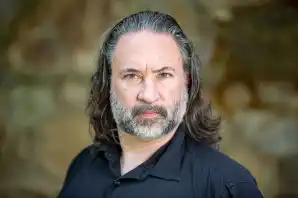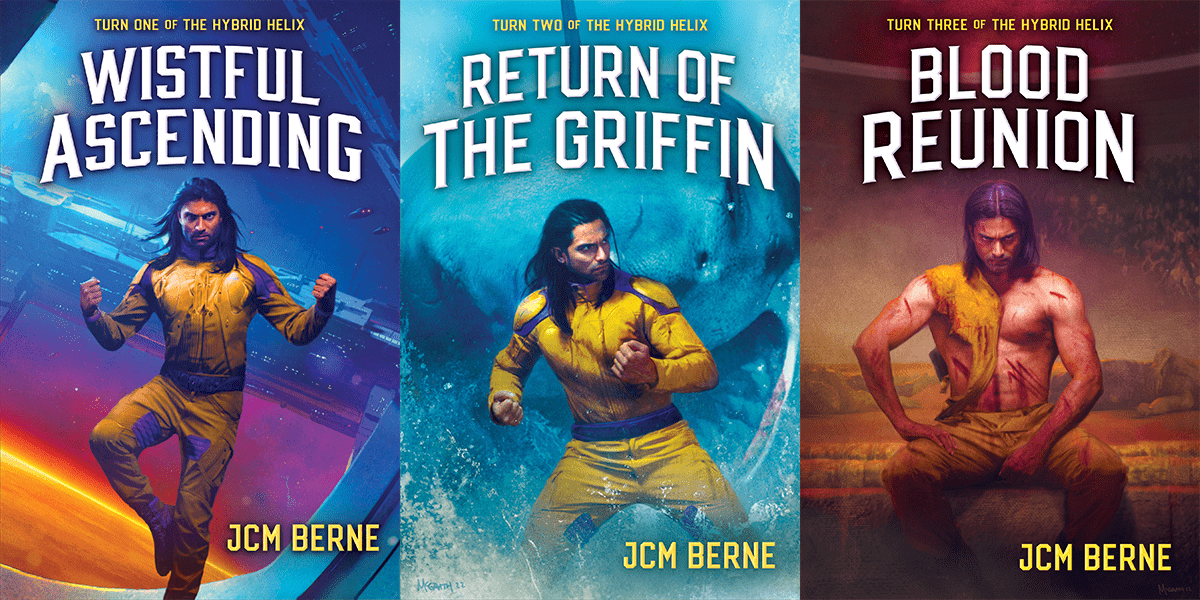March of the Sequels: JCM Berne
1 Mar 2023The Author/s

JCM Berne
JCM Berne has reached middle age without outgrowing the notion that superheroes are cool. Code monkey by day, by night he slaves over a hot keyboard to prove that superhero stories can be engaging and funny without being dark or silly.
The Interview
First of all, tell me a little about your series and introduce us to the sequel
The Hybrid Helix takes place in a science fantasy world. Beings with extraordinary magical powers fly alongside intelligent spaceships and face off against an empire that spans half a galaxy. Rohan, a half-human with powers that make him a living weapon of mass destruction, has spent ten years fighting for that empire. Now retired to the sentient space station Wistful, he’s looking for a peaceful life: a nine-to-five job, a place to get good coffee, maybe a girlfriend. Then, of course, things happen, and he’s forced to decide how far he’s willing to go to protect the people he cares about. The typical reluctant hero story!
In our sequel, people come from Earth with some bad news: the human race is on the verge of extinction. They’re looking for a hero, but their hero is dead, and the only person available is Rohan. He goes, taking the trip back home that he’d been avoiding for a decade, hoping that his old friends and family will forgive him if he can save the planet.

Do you find that most of your readers continue to read the whole series? Why do you think that is?
It’s hard to say! If I look at this year’s Kindle Unlimited page reads (which is the only way I can really tell if someone has actually read the book), my sequels get many fewer page reads than book 1. I suspect that’s normal - people try a book, and unless they love it, they move on rather than trying the sequel. I have an even bigger drop-off between books 2 and 3, probably (if I had to guess) because there are some politics in book 2 that turn off a subset of readers.
How difficult is it to add new characters in a sequel into already established relationships?
Adding new characters is easy! People come and go all the time; people are added to friend groups all the time. It’s just a matter of making it believable. The harder part is doing justice to both those new characters and the old ones. You only have a certain number of pages, and ignoring old favorites for shiny new people can alienate readers.
I might have gone too far in this direction myself! Return of The Griffin takes place on Earth, a different setting, with a largely distinct cast of characters from book one. I felt I had to do it for long-term planning reasons, but it might have been a mistake!
Is it difficult to continue with worldbuilding for a world you have already built in book 1? Do you find it easier to switch locations for the sequel and start again with worldbuilding?
The big picture worldbuilding is set and has been for a while. Once you understand the principles of things - the major powers, the big questions of how civilization works in your setting - the details aren’t that tricky. I got ideas for what Earth was like pretty quickly once I figured out the history - how much alien tech they have, what happened after the heroes left, that sort of thing. Switching locations didn’t really make it harder or easier. Leaving the cast behind made things tougher!
Your three books are kinda different between them. Why this kind of election?
If I wrote the same book over and over again I’d get bored! I can’t do it. Each book has to have progress. My characters have to grow and change and make different mistakes. I wanted to expose different parts of history - of the characters and the setting. And it’s a helix! We start in one place, swing to another, then swing back to a new spot over where we started. Book 4 takes place on both Earth and Wistful. Book 5 will probably be largely in a new place. I like to keep mixing things up!
Despite publishing in 2020 (if I’m not wrong) I feel the book really exploded in 2022. Any reason about it?
Jordan Buxton!
I entered SPFBO in 2022, looking to drum up attention for books two and three. I’m not sure it worked exactly - I was eliminated in the first round - but it got me my first reviews (my big break was with Jordan) outside my own friend circle. Once a couple of reviewers read and liked Wistful Ascending, others took a look, and things kind of steamrolled from there.
I sort of planned this. I didn’t want to try to do a big marketing push in 2021 before book two was released. Selling a single book is very hard. Once you have a series, every new reader can result in three sales instead of one, and the math works in the author’s favor.
Really, the surge in popularity is mostly because the books got into the hands of some reviewers who really resonated with them! None of them had even heard of Wistful Ascending before June 2022.
Have you ever been stymied by a worldbuilding or plot detail from book 1 that is very inconvenient to deal with or write your way around in subsequent books?
I’m trying to think of something! I’m afraid to say anything and draw attention to my mistakes!
I allude to one or two things, minor issues, that are going to be hard to work into the rest of my worldbuilding. There’s a four (at least) dimensional short-order cook in Wistful Ascending - I really don’t explore or explain much about her people or how they fit into the larger society, and I probably never will.
Mostly, for me, the fun part is tossing a lot of world-building details in almost at random and then finding ways to relate them to bigger things later on. Worldbuilding details are never obstacles to me, they’re opportunities. Like the Ursans. We learn their purpose in Blood Reunion - why they were made. I absolutely had not thought of that until long after finishing Wistful Ascending.
Would you say your craft has improved with the subsequent books?
I would! That’s not really the question though, is it? What you want to know is, would other people say that?
I had not studied writing at all when I first wrote Wistful Ascending. After releasing it I started to take classes, learn from an editor, study podcasts, and so on. I tried to learn how to write after the first book was out. I did rewrite WA, twice now, and I think it’s much better than it was. But it’s not really my place to say!
Do you have all the timeline planned for the full series?
Absolutely not.
I have a rough idea of how I want Rohan’s situation to change over time, and where I want him to end up, and what I want him to accomplish at the end. I also know I only get ideas at a certain pace. If I waited to get enough ideas to flesh out the next 22 books before writing book 4, it would be a very long time.
I do plot a book or two in advance. While writing book 4 I’ll flesh out book 5 and I’ll get at least a skeleton outline for book 6 (I hope). That’s the general plan. Rohan’s attitude about certain global things has to change, and it has to be both gradual and earned. It’s a tricky process!
Do you have any marketing tips for sequels?
Actually, the opposite! To market a sequel, market the first book. If people read and love the first book, they’ll pick up the sequel; if they don’t like book one, there’s no point in marketing book two.
But really, my best marketing tip is to not take marketing tips from me. Go find someone who is selling more books!
Remember that you can get Return of the Griffin from Amazon or read it on Kindle Unlimited.
